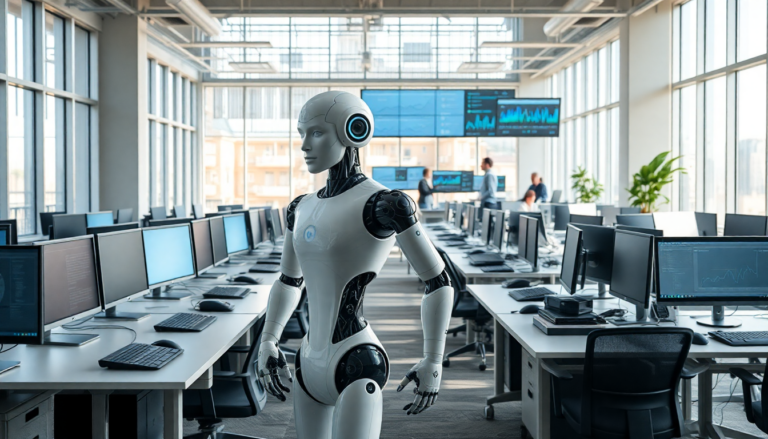Argomenti trattati
Imagine walking into your office, and instead of the usual chatter and clamor, you hear the soft whir of machines seamlessly handling tasks that once took hours. This isn’t a scene from a science fiction movie; it’s the reality of many modern workplaces today, where artificial intelligence (AI) is not just a buzzword but a transformative force reshaping how we work. The integration of AI into daily operations has sparked a revolution, and professionals across various sectors are starting to feel its effects, whether they realize it or not.
How AI is changing the landscape of work
AI’s impact on the workplace is multi-faceted, touching everything from simple task automation to more complex decision-making processes. For instance, consider the rise of AI-driven customer service chatbots. These digital assistants are designed to handle inquiries, troubleshoot issues, and even process transactions, all while learning and adapting to user interactions. I remember when I first encountered one of these chatbots during a late-night online shopping spree. Initially skeptical, I was amazed at how quickly it resolved my queries, making the process not just efficient but surprisingly pleasant.
But it’s not just customer service that’s benefitting. In project management, AI tools can analyze project timelines, identify potential bottlenecks, and even suggest optimal resource allocations. This functionality allows teams to operate with a level of precision and foresight that was previously unimaginable. Yet, as many know, this advancement doesn’t come without its challenges. The more we lean on AI, the more we must grapple with questions of job displacement and the ethics of automation. Is it a blessing or a curse? Personally, I believe it’s a bit of both.
The balance of productivity and human touch
As AI continues to take on more responsibilities, finding the right balance between productivity and the human touch becomes crucial. While AI excels at data processing and repetitive tasks, it lacks the emotional intelligence that humans bring to the table. For example, during a recent team meeting, we relied on AI-generated reports to guide our discussion. The data was insightful, but it was the human perspectives that sparked genuine creativity and innovation. It’s a reminder that while AI can enhance our capabilities, it can’t replace the unique value of human intuition and creativity.
Moreover, the introduction of AI into the workplace raises questions about the future of job roles. Are we preparing our workforce for a reality where AI takes over certain tasks? Companies must invest in training programs that equip employees with the skills necessary to thrive alongside AI technologies. After all, it’s not about replacing human workers but augmenting their abilities. There’s a certain thrill in learning how to work in tandem with AI systems, turning potential competition into collaboration.
The ethical implications of AI
Diving deeper into the conversation, ethical considerations surrounding AI integration cannot be ignored. With great power comes great responsibility, and companies must tread carefully as they implement these technologies. Issues like data privacy, algorithmic bias, and the potential for surveillance loom large. As recently reported by a study, many employees express concern over how their data is collected and used, leading to a climate of mistrust. It’s essential for organizations to establish clear guidelines and transparent practices to alleviate these fears.
Yet, amidst these challenges, there’s a burgeoning opportunity for innovation. Organizations that prioritize ethical AI practices can position themselves as leaders in their respective fields, fostering a culture of trust and respect. It’s about creating a workplace where technology enhances human capabilities rather than undermines them.
Looking ahead: The future of work with AI
So, what does the future hold for AI in the workplace? As technology continues to evolve, we can expect even more sophisticated applications of AI across various sectors. Think about it: AI could soon play a role in predicting market trends, improving employee well-being, and even personalizing learning experiences for professional development. The possibilities are endless and, quite frankly, exciting.
But let’s not get lost in the hype. While AI presents remarkable opportunities, it’s essential to approach its integration with a critical eye. Will we embrace this technology as a partner in our professional journeys, or will we let it dictate the terms? The choice lies with us. The workplace of the future is not just about technology; it’s about how we choose to harness it for the betterment of all.

